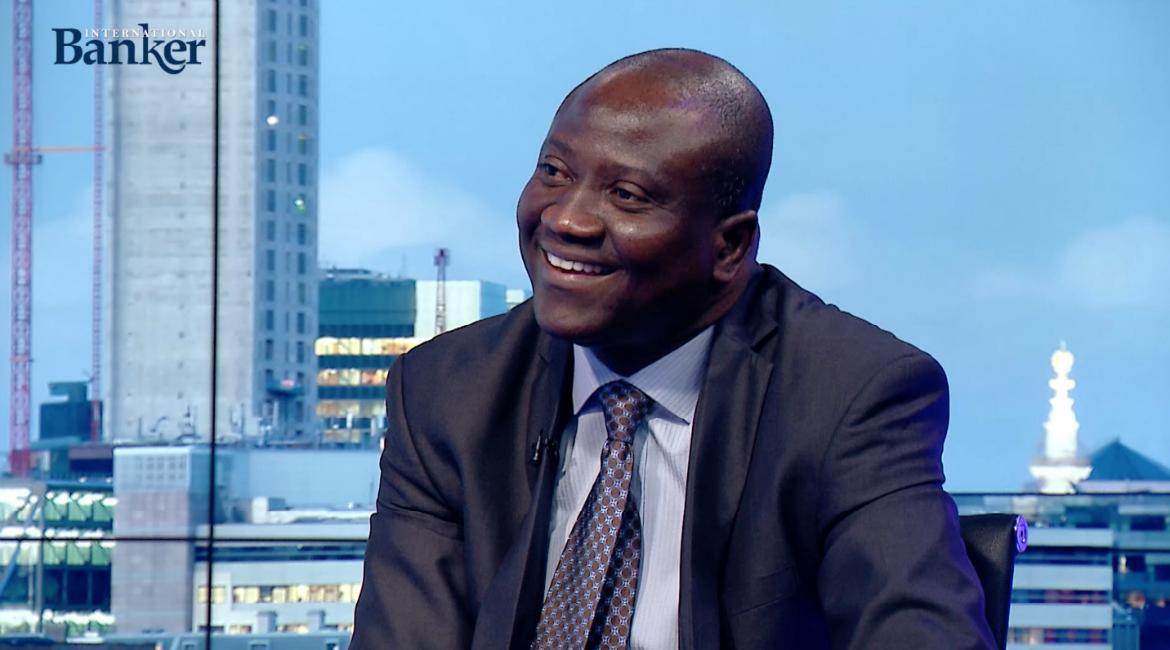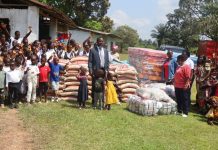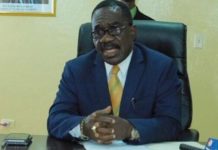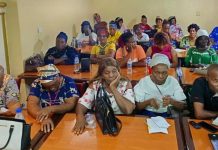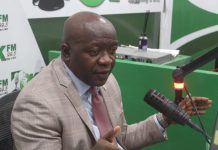Africa-Press – Liberia. This week, the GNN-Liberia is once more pleased to highlight one of Liberia’s reliable financial institutions, the International Bank (Liberia) which has been considered by this author as one of Liberia’s most reliable banking hub, making the difference in the sector.
The man behind such successful institution is its Chief Executive Officer, Mr, Henry F. Saamoi, his level of leadership and professionalism has won the heart of this writer to publicly profile him as the most effective and well suited financial superman of our time.
Few years ago, the International Banker platform exclusively interviewed him on the bank’s role in the rapid growth of the Liberian economy, and his resounded leadership applied in the institution of the digital solutions being implemented, aimed at improving customer service and his long career in banking.
Currently the bank under the sound administrative leadership has moved to its modern headquarters, its construction in the Sinkor environment has given that community a modern look in the area of infrastructural development of his institution which has rapidly given birth to a modern banking structure in Liberia.
This dream on the part of the IN’s management to have its own modern state-of-the-art headquarters must be lauded by all Liberians, including the business community by given a complete facelift to the beauty of Africa’s oldest city, Monrovia.
Speaking to that platform three years ago, Mr. Saamoi said in a rather serious mood, “Achieving this goal is a moving target because of the demand that is placed on our industry base and customer needs, customer wants, meeting customer satisfaction and the improvement in technology. Having said that, I will say at this point that we’ve come a long way in achieving this goal. We’ve come from a one-branch bank to a bank that now has almost 15 locations providing services in 15 locations. We think that that has brought us closer to our clientele; that has made us a bank of choice because we’ve reached out to our customers with these services right at their doorsteps. And that is something that we look forward to doing as we cover the entire country. We have not covered the entire country yet. We’re gradually on the path to doing that. We think that with time, we should be able to achieve that, but at this point in time we’ve made significant strides in achieving that singular objective.
On his success story at the bank, Mr. Saamoi said, “So firstly, every CEO wants to show profits at the end of every year. So that’s one way to measure success. Since 2007, when we had new shareholders coming in, the bank has made steady progress, has made profits almost from year to year, and that has been growing quite steadily. And the thing… that’s one way to measure my success as a CEO of the bank. I took over in 2012, and since 2012 the bank has consistently made profits. So that’s one way. The other way to measure my success is the young team that we have been able to bring onboard. When the convening of the shareholders, the current shareholders, in 2007, the average age of our employees was about 65. Today the average age of our employees is about, the median is 33, 35 years old. Which is quite significant for me. Also, prior to their coming in there were a number of expatriate staff, which today we do not have. We’re now composed of a Liberian staff; almost 99.9 percent of our staff is Liberian. Local Liberians, hired, trained in Liberia. And I think that’s, you know, a significant success for us as a bank”.
On the US$20 Million loan obtained to support his bank in vn 2016 from the Overseas Private Investment Corporation, the US government’s development-finance institution to support lending in various different sectors, like construction services, manufacturing and transportation, the IB boss said, “First of all, let me begin by saying how proud we are as a bank, and how proud I am as a CEO of the bank, to firstly have been approved by OPIC. The due-diligence process is a long due-diligence process that took almost two years to get to the point of signing of an agreement and going into the disbursement phase.
Now, coming to the achievement of the goals, a significant effort has been made to achieve that goal. While it is true that some 20 million has been fully disbursed, it does not meet the demands of the market. But for those sectors, and those businesses that we’ve invested in, who have benefited from these, from this facility, quite a number of them feel fully satisfied with where we’ve taken their businesses from to where they are today—both in terms of growth in their income, growth in their market share, both in terms of employment. Because a number of them have been able to expand their businesses, and that has helped employment in each of the sectors that they work in today.
So firstly, those partnerships with Pan African Capital Group and Trust Bank, they are shareholders. So Pan African Capital Group, through its investment arm, Liberia Financial Holdings, is the largest single shareholder in the bank. And Trust Bank comes in as the minority shareholder. Databank in Gambia, or Ghana, comes in as a significant partner, a strategic partner, in helping us to deliver services to the region. And based on this partnership, we’ve been able to leverage all the capabilities that each of them brings to the table. Pan African Capital Group, what it brings to the table. Trust Bank in Gambia, Databank in Ghana bring significant improvement to our processes, to our procedures and policy that we have to put in place. And we think that this has been very significant in getting the bank to where it is today. Because when they came in as shareholders in early 2007, the capital of the bank was just about 2 million. Today we can boast of an equity position of almost 17 million. When they came into the bank in 2007, the total balance sheet of the bank was about 20 million. Today, we boast of a balance sheet of 125 million. So we think that this partnership has had a significant improvement on the bank’s performance in its position in the market space in Liberia.
Regarding gaining more relationships with others, Mr. Saamoi answered affirmatively, “Absolutely. We are looking forward to these partnerships. As a result of the facility being granted us by OPIC, we now have all the institutions who have recognized it for the role that IB plays in the market. The governance processes that it has in place, which are quite important to the operation of the bank. So we have institutions like the African Investment Bank offering us a line of credit. We have the African Development Bank offering us a line of credit. We also have an improvement in relationship with our correspondent banks. Our crown agent, who happens to be one of our significant correspondent banks, has also now given us a line of credit and has even increased the initial line of credit that they provided us. We also enjoy a line of credit with our other partner based in London, here, the Bank of Beirut. They’ve also given us a line of credit. So there is a significant improvement at the bank. Yes, looking really good, because of these partnerships; the partnerships that we have have improved the level of performance of the institution.
On the bank’s digital-banking solutions, he said, “We have an internet-banking platform currently. We have an SMS-banking platform currently. What we’re doing now is moving that to a new level wherein we are able to offer say, like, you know, an agency banking time that operates on the back of the strength of our e-banking platform. So currently we are trying to deploy a system which enhances the services that we provide to our clients at the moment. So today we have ATMs that are available, that can do multifunction. You are able to pay your bills on our ATM platform. You are able to transfer funds from one account to the other. We’re trying to link up with the central bank wherein we can access the ATMs of other institutions. That is a project that is ongoing; it’s a work in progress, based on the central bank’s own position at the moment. So we’ve been able to tailor these services to meet the needs of our clients and to improve and enhance our customer service to our clients without having them have to walk into our banking facilities, into the physical premises, wherein they can perform services at our ATMs or on just their mobile phones.
Well, let me say first that the banking landscape in Liberia has its own challenges. Has its own shortcomings. For instance, we do not have a robust credit-reference bureau yet, so that is a project that is ongoing by the central bank, and the banks are all involved in this project. The project has reached a stage wherein staff of the individual banks have been onboarded. So we are moving to the second phase of onboarding our clients.
Now, having said that, because of that limitation, the credit process takes a little bit longer. When that is completed, and then we can do a due diligence, we can check out on a customer’s performance within the sector at the click of a mouse; then, of course, that process gets shortened. At this point in time, we have to do a due diligence, and borrowing is basically based on our relationship on, you know, on the customers that we know, that we interact with on a daily basis. And so while it’s true that we want to shorten the period, we also want to be careful that we make the right decisions so that our loans get repaid, and that they do not go into the nonperforming category.
I think to some extent, yes, it has helped me a great deal, because it has helped me to understand all of the processes, all of the procedures, and then understand the people also that I work with. And that has helped me in terms of my leadership role at the bank. Because these are people that I have come a long way with; I have worked with them over the years. Some have seen me as an intern and grown up to become the CEO of the bank. Some have come along when I joined. And I think, yes, it’s given me, you know, some sort of comfort in the running of the affairs of the bank.
And it’s made me aware of, you know, what the challenges are, where the opportunities of the institution are, how we can harness the challenges that we have—to turn those challenges into opportunities of the bank, which is what I try to do daily in my work as a CEO of the bank. Both in utilizing, you know, the skill sets that I have available to me and utilizing the resources, trying to manage them in the way that, you know, brings significant returns to the owners, to the shareholders—that is my key goal. And I think, you know, going through that chain has helped me a lot to understand exactly what the needs of my staff are, what the expectations are. At the same time, understanding what the expectations of my shareholders are—to whom I owe, you know, my loyalty in terms of performing my role and also delivering results to them.
Having been there for so long, you must feel extremely close to the bank, I would imagine. How do you … I mean, clearly a bank like any other business has to make profits; it has to make money. But the history of IB is much bigger and deeper than that, isn’t it? And you’ve had to see it through some pretty testing times.
Absolutely. I’ve seen the bank go through some pretty tough times. We’ve gone through it, and I’ve seen it, almost all. I wasn’t there when the war broke out in 1989. But I joined at a time where there was still war in the country. So I started my internship in 1999; then I got full-time hired in 2000. And in 2003, there was an outbreak of civil, you know, crisis again in Monrovia. And this time, even though I worked with expatriate staff, I was actually left in charge of the bank when I was its senior manager in the bank. I was a lower-level manager, but because of trust and confidence in my ability, I was left in charge. And I had to oversee that crisis-management team as a junior manager in the bank.
It was a terrifying moment, but when a responsibility is given to you, you have to brace yourself for the challenges that lie ahead. And to some extent I think I did that quite well, although almost at the peril of my own life. Because at some point in time, I almost got caught up in a crossfire trying to secure vital documents of the bank, to move them out to safety. And I got caught up in the fighting, but I still made my way through. I was able to get those documents out and move them to safety. And then came the Ebola crisis. And this time I was actually in charge of the bank. And that was a scary moment in the country, when every other expatriate senior staff of other commercial institutions, of other institutions in fact, had to leave the country.
And I had to stay on to work with my team, to keep them safe. And so I was able to do that again, you know, very successfully. You know, building up a team that was quite cooperative with me. And we tried to put in, I mean, all of the mechanisms that would protect not only my staff but would even protect their families at home. And so we did that quite successfully. To understand that, I can boast that we did not suffer any casualties; neither did my staff’s immediate families suffer any casualties. They were both saved because of the measures that were introduced at the bank, the education that were provided them—both for themselves and their families at the very tail end. So we’re quite successful in doing that.
It does to some extent. But this organization actually focuses on civic duties of citizens. So you try to work with the citizens with the intent of, you know, their participation in, you know, the electoral processes. So it kind of educates, you know, educates the citizens in what their own rights, duties, as responsible citizens are. So that actually helps me. But beyond that, I also work on seven boards that basically deal with the youth. Currently, I serve on the board of AIESEC Liberia, which is a student-run organization that is basically trying to develop the youth. I also serve on a board of a youth organization called Smart Liberia.
(Director)My interest is actually working with youth, trying to build up their capacity so that they can take up leadership roles in the future. So while it’s true that this organization is basically a citizen’s movement, it’s a civic, you know, performs civic duties. I’m also interested in working with the young people to be able to serve as a role model to them. So that what would be what organizations also that try to build up their skills, build up their own confidence in themselves and what they are able to do if they are given the right space, if they’re given the right opportunities. So that these are things that I also love to do in, you know, in addition to my current role as a CEO of a bank.
I think it’s the opportunities to get the right education. I think that is still a challenge. It’s coming, but it’s coming, you know, rather slowly. So for those of us who are in positions that can help youth, it’s getting closer to them to work with them in trying to create these opportunities for them that also they can improve their level. Because, let me say this, the country had 15 years of civil crisis. That actually hit the country really, really hard in terms of brain drain. So all of the qualified Liberians either left the country and never came back. And so what we have now—we have to make do with what talents that we have currently and try to improve on them. So that’s the reason why you are seeing that a number of institutions have expatriates coming in to provide some critical roles until the Liberians are able to take over from them.
I’m a classic example. When a new one … prior to the coming in of Liberia Financial Holdings, Pan African Capital and Trust Bank, the bank was actually run by expatriates. They were very … no Liberian occupied the position that I occupy today in the bank. And then came in Pan African Capital and Trust Bank. When they came in also they brought in expatriate staff. But during that period, they gave me the opportunity to also seek education. So I was able to go to school. I attended a graduate school in banking, the University of Wisconsin, wherein I could improve my skills. And so that has helped me to be able to take up this challenge and deliver on it. So that is one of the challenges that is, you know. That is one of the things that is missing within our sector is, you know, getting the right skill set. And I think it’s a gradual process, you know. So young people have to be given opportunities wherein they can improve on their skill set, wherein they’re able to take on these challenges as, you know, the openings come knocking on their doors.
That is exactly what we are trying to do as a bank, because we realize that there is a huge unbanked population. So, then, what we are trying to do is to tailor our services that tracks the unbanked population. And then trying to create opportunities for them also in order to improve their understanding of financial services, because that is also the challenge. And currently what we have is that when a client walks into the bank—for instance, for a facility; they want a loan. They do not know how to put together their proposal. They hand you just a piece of paper that says, “I want a loan.” So, “Why do you want a loan?”
There’s no proposal stated. There is no analysis done. There’s no financial statement that they present. So financial literacy is also really, really key for us as an institution. So what we now do is when those clients walk in, we have to sit with them and go through like a fundamentals of financial literacy so that they understand. Because that’s the only way they are able to manage their businesses, make returns, pay back the bank and then reinvest whatever their profit is into the bank. So in terms of financial inclusion, that is also a challenge we are trying to address. But to address that means that you have to address financial literacy.
Because that’s the only way they understand that when you borrow money, you have a responsibility to pay it back to the bank. That’s the only way the next person benefits from you. And so it’s a two-way street, actually. So one way is, yes, we want to bring on people. But then we have to educate them also so that they are able to manage their businesses in a way that returns profits to them. Otherwise, we end up with huge NPLs, nonperforming loans, which as you know, that hurts the banks. And so we have that challenge right now, and we are trying to address it. And address it in a systematic order.
I think there has been a significant improvement in the level of trust among the Liberian population, you know, for the banking sector. In the past, there were a number of bank failures. But for the last 15 years, we have had a banking system quite still and stable, thanks to the regulator that has brought in a number of regulations that track banks when they’re having issues in that they can come in. That has worked in favor of the banking sector. So the level of confidence is actually growing. We can’t say we’ve gotten there yet; it’s not yet 100 percent. But it is growing based on the level of stability that the populace has seen within the last 15 years. There has been no bank failure; there has been a takeover of a bank. But depositors did not suffer, because the central bank regulated, managed the process quite well and brought in an early investor that took over the bank that was having a challenge. But that was managed quite well. And the other banks are being regulated in a way that none of them is yet in a distressed position. And I think that that is giving the populace a level of confidence within the banking sector.
So what we pride ourselves at IB is that we, firstly, we are a family. That’s how we pride ourselves; that’s how we work initially. And then to retain talents is through training. We have a structured training program for our staff, which includes both in country and out of country. Currently we have two staff that are enrolled in the graduate program at the University of Wisconsin currently. And so, we’ve sent a number of staff, including myself. I was the first beneficiary of that project. And I came back, and today, well, I’m with the bank and staying on.
We’ve seen others who have also come back and are contributing quite significantly to the growth and development of the bank. So young ones that are coming in, I’ve seen a lot say, “If I stay on, there is a significant opportunity for me to get trained. And as I get trained, then it comes with growth in terms of my profile within the institution, and that can also help me in my future banking career, be it with the bank or outside of the bank.” So the way to do that is training. So we focus heavily on training. That’s the way we’ve been able to retain talent within the bank, assuring them of, you know, giving them constant training. And improving their work environment. Their work environment is such a friendly environment, and it cascades down from the shareholders to the board to the senior management and the supervisors. We see ourselves as a family. And once we start buying into that then, of course, the retention rate kind of increases.
I think there’s been a significant improvement within the banking landscape in Liberia. Quite honestly, we give credit to the Central Bank of Liberia. And that started with the Financial Institutions Act of 1999 that began to put in place policies and regulations that guide operations of financial institutions in the country. That has significantly improved the quality of services that banks are offering. That has helped banks to stabilize. The central bank is able to detect early warning signs of the bank going into a situation, and they can come in with the right policies and right procedures—working with the shareholders, working with the board, working with the management—in order to improve on it and in order to cure that deficiency, which they have noticed almost immediately. So there are early warning signals that the central bank has based on the reports that were returned to them on a daily basis, on a weekly basis, on a monthly basis, on a quarterly basis, on a biannual basis and on an annual basis.
If you ask me, at this point in time… I haven’t quite gotten there yet, but I can see at this point in time is keeping together a young team of Liberian professionals and getting the bank to perform beyond our own imagination, beyond our own expectations. Because, when we look at our bank and compare it against the competitors in the market that leverage on so much opportunities that they have based on what their parents are able to do, based on relationships that they have, I think that, you know, that’s one of the successes that I really count. Because we’ve been able to remain steady. We’ve been able to compete with them, with the big banks, so-called. You know, big banks. That are members of groups. We are not a member of a group. We have one single shareholder who is determined to see that this bank grows. So under the watch of this single, you know, largest shareholder and a board of directors that is focused on seeing that the right things have been done in the bank, we’ve seen a significant improvement. Like I indicated earlier on, under their watch, we’ve seen the asset size of the bank grow from 20 million to 125 million.
We’ve seen the bank move from a loss position to a profit-making position. That is quite significant for us, and it has been steady. It’s not been: one year, you make a loss; in the second year, you make a profit. No. It has been a profit, an incremental profit, year-on-year. And I think that that is a significant achievement for me as a young professional working with a team of young labor and professionals. Like I said, the median age of our staff right now is about 35. That’s quite significant in working almost 99.9 percent local talent, not expatriates, not foreign talent, but just local talents. That, I think, is a significant achievement for me. And being able to manage this group to where we are and to, you know, where we want to get to within the next 5 to 10 years to move this bank out of Liberia to the shores of other, to the neighboring countries, I think this is for me quite significant.

